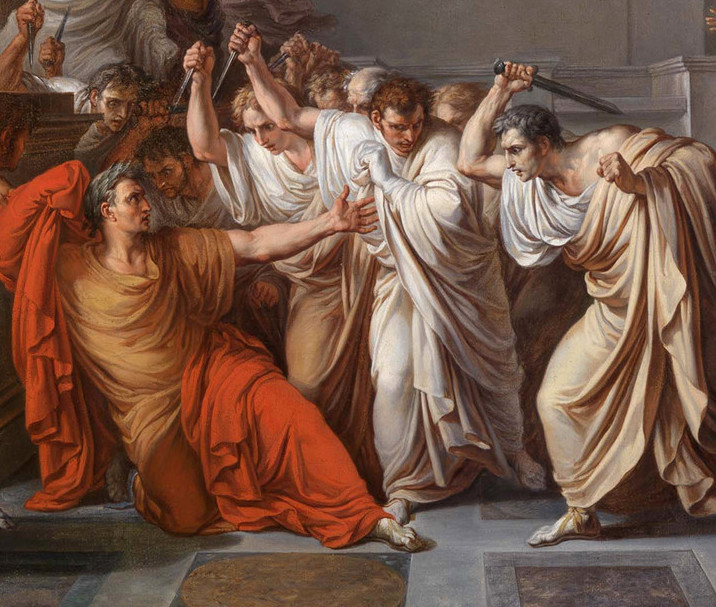Copyright ieyenews

History shows that even the strongest republics crumble when leaders and citizens neglect their duties. Summary: In this essay, Martina Moneke explores what America can learn from the decline of the Roman Republic. She examines how inequality, political factionalism, and unchecked ambition eroded civic trust and institutional stability in Rome—and draws parallels to challenges facing the United States today. Through insights from thinkers such as Cicero, Sallust, Seneca, and Marcus Aurelius, Moneke highlights the enduring importance of civic responsibility, ethical leadership, and vigilance in sustaining a republic. Author: Martina Moneke Author Bio: Martina Moneke writes about culture and politics. She won the Los Angeles Press Club First Place Award for Election Editorials in 2022. She lives in Los Angeles and New York. Date: November 3, 2025 Image:https://commons.wikimedia.org/wiki/File:Vincenzo_Camuccini,_The_Death_of_Julius_Caesar_(detail).jpg Invading armies can topple a state, but republics are often undone from within—by the neglect of those sworn to their care. Rome, with its Senate, vast provinces, and ideals of civic virtue, offers a mirror for our uncertain age, showing how ambition untethered from duty, loyalty measured by faction rather than service, and the slow decay of shared norms can bring even a mighty civilization to its knees. More than fifteen centuries later, the United States faces its own internal trial: partisan division, legislative paralysis, and the erosion of public trust strain the institutions meant to preserve the republic. An examination of Rome’s fall prompts a pressing question: what do we safeguard—and at what cost—when the health of democracy relies on the integrity and engagement of its leaders and citizens alike? By the third century BCE, the Roman Senate had become a theater of self-interest and personal ambition. Senators wielded power not for Rome, but for themselves, cultivating loyalty through favoritism rather than civic duty. In his First Oration Against Catiline (63 BCE)—confronting the would-be usurper who sought to seize control of the state—Cicero thundered, “To what point, Catiline, will you abuse our patience? How long will your madness elude us? To what limit will your unrestrained audacity leap?” Nearly two decades later, the assassination of Julius Caesar showed how private grievances could escalate into political violence, often justified as a defense of the Republic. Cicero himself became ensnared in the deadly struggle with Mark Antony, who demanded his execution—a stark example of vendettas overriding reason and law. Petty rivalries, grudges, and performative politics rippled through the Senate and the wider state, shaking foundations that had once seemed unshakable. Even venerable institutions can crumble when personal ambition outweighs the common good—and Rome’s thinkers offered both guidance and warning. Cicero wrote, “The welfare of the people is the ultimate law.” Julius Caesar observed, “In war, events of importance are the result of trivial causes.” Their insight endures: the stability of a republic depends on leaders’ integrity, and even small lapses of duty or moments of self-interest can ripple outward, threatening the structures of governance and underscoring that the welfare of the people must always remain paramount. Stoic philosophy provides a counterpoint. Marcus Aurelius insisted that leadership requires virtue, discipline, and attentiveness to the common good. Power without principle corrodes civic life; reason and temperance, he argued, are inseparable from the health of the state. Centuries later, Theodore Roosevelt carried a copy of Meditations on his 1913–1914 expedition down the River of Doubt, drawing on Aurelius’ counsel to confront adversity with courage, patience, and integrity. Roosevelt’s principled judgment in extreme circumstances illustrates a timeless truth: ethical leadership comes first—law, policy, and authority follow the character of those who wield them. Yet Rome’s downfall was driven not only by ambition but also by widening gaps between rich and poor, the erosion of civic bonds, and the neglect of ordinary citizens. Beneath marble columns and the lofty rhetoric of the Senate, a vast society strained under the weight of disparity: immense wealth concentrated in the hands of a few, while the many endured insecurity and want. Luxury villas and glittering banquets rose beside crowded insulae—the multi-story apartments where plebeians struggled to survive—and as the upper echelon pursued indulgence, social cohesion frayed. Rome’s top one percent controlled sixteen percent of the wealth; in America today, the figure is closer to forty. History does not repeat itself exactly, but overindulgence follows a familiar pattern: Pliny the Elder’s observation that “Luxury has even invaded our homes, and what was once a vice has become the very mode of life” could serve as a critique of America’s affluent class. Such behavior reshaped social expectations; in a moral vacuum, civic duty became performative. Public support turned into a fragile currency, traded through patronage and spectacle. Historians from Edward Gibbon to Mary Beard have chronicled Rome’s external pressures—barbarian invasions, border skirmishes, fiscal crises—but internal rot proved decisive. The Republic’s glory, once anchored in collective responsibility, now wavered under indulgence and pretense. Similarly, social fracture and growing disparity now erode the invisible architecture that has sustained the American democratic experiment for 250 years. The arc of Rome’s decline demonstrates that a society’s stability depends on more than legal and political structures; it requires leaders who align action with character and power with principle, negotiating between personal ambition and the collective good. Ethical reflection enables them to face adversity with courage, patience, and moral clarity rather than expedience. Political deadlock, inequality, and the erosion of shared norms compound these risks. Rome’s culture of display and neglect of ordinary citizens weakened civic bonds, leaving the social fabric frayed and fragile. In America today, economic gaps, partisan media, and entrenched political factions portend similar grave consequences. Just as Rome’s divisions created fertile ground for instability, contemporary fractures amplify distrust and diminish shared civic purpose—an urgent reminder that democracy thrives only when nurtured by vigilance and virtue. But as republics are shaped by their leaders, so too are leaders shaped by the citizens who place them in power. As the French philosopher Joseph de Maistre keenly observed, “Every country has the government it deserves”—a timeless reminder that civic engagement, or its absence, determines the character of a society’s leadership. Rome’s story illustrates the same principle: when ambition, wealth disparities, and apathy go unchecked, even the strongest institutions can erode. Modern America faces similar challenges. Ethical stewardship and active participation are not optional; they are essential safeguards against democratic decline. So, the lesson from centuries past persists. Republics endure not by inertia but through the care of those who inhabit them. Civic virtue is fragile, and trust, once broken, is not easily restored. Ambition must be tempered, principle upheld, and the common good preserved—lest even the most venerable states collapse under the weight of their own divisions. As the Roman historian Sallust wrote in the first century BCE, “Ambition drove many men to become false, to have one thought locked in the breast, another ready on the tongue.” His words endure across the ages as a guide to every republic that mistakes appearance for principle, privilege for merit, and comfort for strength—proof that Rome’s lessons are not whispers of history, but an urgent warning for today. Credit Line: This article is licensed by the author under the Creative Commons Attribution-NonCommercial-ShareAlike 4.0 International License (CC BY-NC-SA 4.0)



